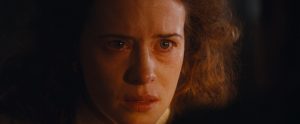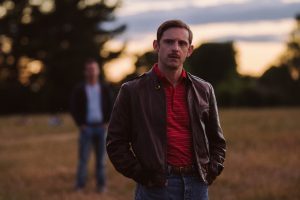Whether we want to admit it or not, we want our parents’ approval. It’s instinctual, especially for most queer people. If you lose those figures in your life, where does that need go? Does it still exist but we tuck it somewhere inside us? In Andrew Haigh’s emotionally towering All Of Us Strangers, Claire Foy and Jamie Bell play parents trying to make up for lost time—for however long they have. It forces us to wonder what we would try to get right if given another chance to tell the truth.
Since Mum and Dad live in Andrew Scott’s memories, I wondered if it Foy and Bell discussed approaching these characters any differently. Every time that I’ve seen Haigh’s film, I couldn’t stop thinking about what Mum and Dad do after Scott’s Adam leaves the home, but the pair focused on the moment.
“Its so well-written that who they are as parents and how he was as a son and what their family dynamic was like was so apparent in the way that they spoke to each other,” Foy says. “When the script is as good as this, you don’t have to be expositional and explain everything. The dynamics of who we were very clear, and the only thing, obviously, is how we are playing characters who are out of space and time and living in a different reality. That was the thing that I had to have with myself, because I couldn’t have that rooted too deeply in anything. I couldn’t decide that when they weren’t with Adam that they sat and stared at each other in the room. They disappeared, but they’ve just been doing something even though they hadn’t. They were so used to who they were when they were alive. Anything that was rooted in reality had to go took us out of it.”
“I am playing it as if he is alive,” Bell says. “It’s that simple, and to do it any other way would be distracting. It might lead us down a path that is not of any interest. Certainly not to Andrew Haigh or towards the catharsis of the character to understand that yearning or that acceptance that he was striving for.”
“I know this is going to sound weird, but the reality of who we are in this universe is pretty strange,” Foy says. “The fact that these people are alive is like a dream. It’s so weird to live in that world where we are, and this film plays into the unknown.”
“When Adam accepts it, the audience accepts it,” Bell adds.

The first time that Adam finds himself on his childhood home’s doorstep, Mum begins to step out but hides herself behind the doorframe. It’s similar to when a child hides themselves behind their parents’ legs when meeting a new person. ‘It is you,’ she says, almost in disbelief. There is a tremulous tone in Foy’s voice that alludes to her own nervousness, heartbreak and enthusiasm.
“Andrew wanted me to be slightly hidden, and we did a couple different versions of the hello,” she explains. “I like the one that is in the film where Mum is a bit reticent. They haven’t seen him, so they don’t know what he looks like as an adult. In my head, the thing that emotionally worked for me is that they were waiting for him the entire time. They have been waiting and pining and longing for him to show himself when the time was right for him. When he does, it’s that feeling of neurotic where they are telling each other that they knew certain things would be true. What ends up happening, since we shot it chronologically, they get slightly drunk and they get in that way where they feel like they are back together. They’re right back there, and it feels like something new has happened for them.
I feel like the relationship that she has with him in this film is a very pure and vulnerable. The friends that I have that identify as gay have such unique and beautiful bonds, and you’re seeing, weirdly, the beginning of what they is even if they don’t know it yet. It never comes to fruition since they were taken away when he was so young. The moment where they meet is kind of shy and also a bit like., ‘Wow, you’re so big…and grown up…and oh my god.’ There’s a lot of excitement there.”
Mum hears about Adam’s adult life from Adam himself, but Dad receives the confirmation from Mum. He has time to sit with the information before his son returns, and Haigh gives the men the space to discuss it away from Mum’s prying eyes and ears. Would Dad have reacted differently if Adam told him face to face?
“That’s such an interesting way of thinking about it,” Bell ponders. “He inferred that he always thought that he knew in the dialogue even if how he knew was really prejudiced actually. Adam displayed behavior that Dad, originally, thought was fearful. He may have thought, ‘Oh no, you’re going to be one of those people.’ That’s how a lot of people thought at the time. I think Dad would’ve been as flustered. For example, when Andrew comes into that scene into the lounge, I think he has bee planning for it, because of how Mum reacted to it.”
“It was wrong,” Foy cuts in.
“Dad needed to course correct this in some kind of way,” Bell says. “Even with the time that he has had in between to think about it, he still almost fucks it up. He is still being barbarous and thorny even though he’s had this time and perspective. I would love to say that Dad would be warm, open, and say the right thing, but that’s not true of what Andrew Haigh has established. We are hopeful that people will say and do the right thing, but we almost always get it wrong. It probably doesn’t matter when or how Dad found out. It would probably be as clumsy.”

“I remember us having a conversation about how Dad thought that Adam might be gay because he, as a character, is a sensitive boy,” Foy says. “I hate to generalize as a cliché, but he saw his son that way.”
“It was a real issue with his father, because his dad said he was soft,” Bell says. “Within that, he might think, ‘I’m not fucking soft.’
“He’d self-correct,” Foy suggests.
“Exactly,” Bell confirms, excitedly. “It’s generational. Cyclical.”
An important lesson we can grasp from Strangers is how we can evolve our mindsets even after we step on it in our first reactions. After Adam left his Mum after coming out, Mum obviously thought about how her words hurt her child. We cannot have fulfilling change without seeing how we learn from those errors. There is tremendous honesty in every line of dialogue and both Foy and Bell know that regret can lead to empathy and, ultimately, rightful acceptance.
“I think as long a he can see regret, it matters,” Bell says. “There is some catharsis.”
“There wouldn’t be any films or any books if people didn’t do something and then just go, ‘Well, fuck,’” Foy says. “Everything is watching people getting it wrong or make mistakes and seeing them try to do better. Drama is, a lot of the time, watching people fall over. Everyone is capable of doing extreme harm as much as they are capable of doing great things.”
All Of Us Strangers is in theaters now.
















![2025 Oscars: Can a Late-Breaker Still Win Best Picture? [POLL]](https://www.awardsdaily.com/wp-content/uploads/2024/10/gladiator-350x250.jpg)
